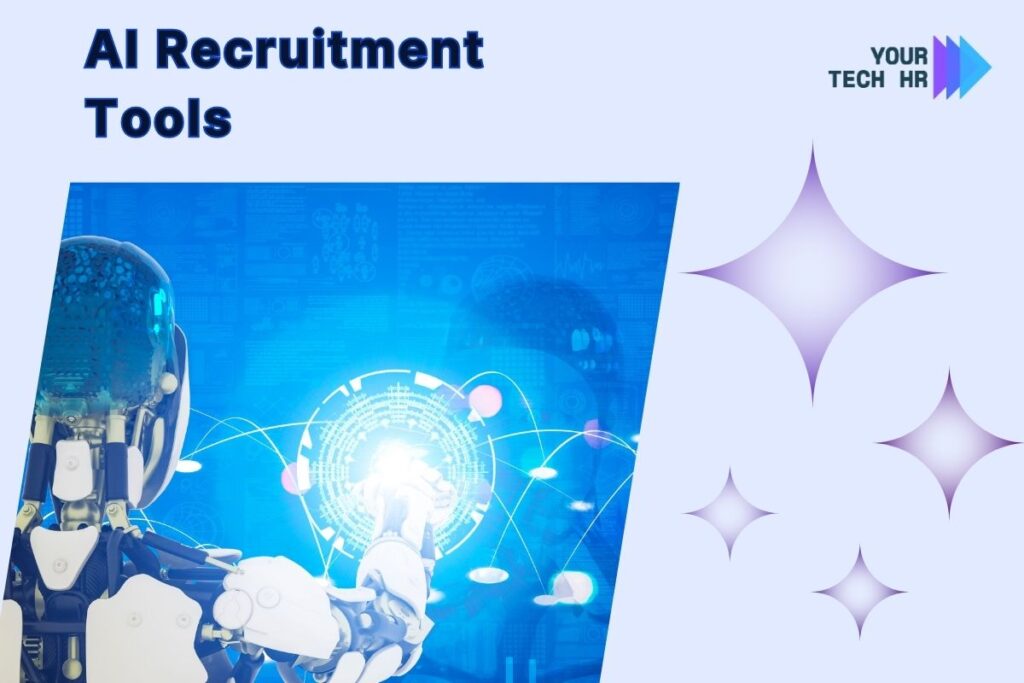In today’s fast-paced business world, finding the right talent quickly and efficiently is more important than ever. That’s where AI recruitment tools come in. These smart technologies are changing the way companies hire, making the process faster, fairer, and more effective. In this blog post, we’ll explore the world of AI recruitment tools, their benefits, and how they’re shaping the future of hiring.
What are AI Recruitment Tools?
AI recruitment tools are software programs that use artificial intelligence to help with various parts of the hiring process. These tools can do things like:
- Sort through resumes
- Match candidates to job openings
- Schedule interviews
- Answer candidate questions
- Conduct initial screenings
Basically, they’re like super-smart assistants that help recruiters and hiring managers do their jobs better and faster.
Why are AI Recruitment Tools Becoming Popular?
There are several reasons why more and more companies are turning to AI recruitment tools:
- Save Time: AI can quickly go through hundreds of resumes, saving recruiters hours of work.
- Reduce Bias: When programmed correctly, AI can focus on skills and qualifications, helping to reduce human biases in hiring.
- Improve Candidate Experience: AI tools can provide quick responses and updates to candidates, keeping them engaged throughout the process.
- Find Better Matches: AI can analyze large amounts of data to find candidates who are the best fit for a role.
- Cost-Effective: While there’s an initial investment, AI tools can save money in the long run by making the hiring process more efficient.
Types of AI Recruitment Tools
Let’s look at some of the main types of AI recruitment tools and how they help in the hiring process.
1. Resume Screening Tools
These tools automatically scan resumes and cover letters to find the best candidates for a job.
How they work:
- They use natural language processing to understand the content of resumes.
- They look for specific keywords, skills, and experiences that match the job requirements.
- They can rank candidates based on how well they match the job description.
Benefits:
- Save time by quickly sorting through large numbers of applications.
- Help ensure no good candidates are overlooked.
- Can be more consistent in evaluating resumes than humans.
Example tools: Ideal, CVViZ, Zoho Recruit
2. Candidate Matching Platforms
These AI-powered platforms help match job seekers with the right job openings.
How they work:
- They analyze both job descriptions and candidate profiles.
- They use AI to understand the requirements of a job and the skills of a candidate.
- They suggest matches based on various factors, including skills, experience, and sometimes even company culture fit.
Benefits:
- Help find candidates who might be overlooked through traditional methods.
- Can match candidates to multiple positions at once.
- Often provide a better experience for job seekers.
Example tools: Eightfold AI, Pymetrics, Wade & Wendy
3. Chatbots and Virtual Assistants
These AI-powered tools help communicate with candidates throughout the hiring process.
How they work:
- They use natural language processing to understand and respond to candidate questions.
- They can schedule interviews, provide updates on application status, and collect initial information from candidates.
- Some can even conduct initial screening interviews.
Benefits:
- Provide 24/7 support to candidates.
- Free up recruiters’ time by handling routine tasks.
- Ensure consistent communication with all candidates.
Example tools: Mya, AllyO, XOR
4. Video Interview Analysis Tools
These tools use AI to analyze video interviews and provide insights to recruiters.
How they work:
- They analyze a candidate’s facial expressions, tone of voice, and word choice during video interviews.
- They can assess things like confidence, honesty, and communication skills.
- Some can even predict job performance based on these analyses.
Benefits:
- Provide additional data points for evaluating candidates.
- Can help standardize the interview evaluation process.
- Allow for asynchronous interviews, making scheduling easier.
Example tools: HireVue, VidCruiter, Spark Hire
5. Predictive Analytics Tools
These tools use AI to predict how successful a candidate might be in a role.
How they work:
- They analyze data from successful employees in similar roles.
- They compare candidate data to this “success profile.”
- They provide predictions on things like job performance, culture fit, and retention likelihood.
Benefits:
- Help companies make more informed hiring decisions.
- Can improve long-term employee retention.
- Provide data-driven insights to complement human judgment.
Example tools: Harver, Koru, PredictiveHire
The Best AI Recruitment Tools for 2024
As we look ahead to 2024, several AI recruitment tools are standing out from the crowd. Here are some of the top contenders:
- Eightfold AI: Known for its powerful candidate matching capabilities and ability to promote diversity in hiring.
- Ideal: Offers comprehensive AI-powered recruitment automation, from resume screening to candidate rediscovery.
- Paradox: Features an AI assistant named Olivia that can handle tasks from scheduling to screening.
- HireVue: Combines video interviewing with AI-powered assessments for a comprehensive candidate evaluation.
- Pymetrics: Uses gamified assessments and AI to match candidates based on cognitive and emotional traits.
- Fetcher: Combines AI-powered sourcing with human expertise to find and engage top talent.
- Hiretual: Offers AI-powered sourcing across multiple platforms and advanced candidate engagement features.
These tools are constantly evolving, so it’s a good idea to keep an eye on their latest features and updates.
How AI is Speeding Up the Hiring Process
One of the biggest benefits of AI recruitment tools is their ability to make hiring faster. Here’s how:
- Quick Resume Screening: AI can scan thousands of resumes in minutes, instantly creating a shortlist of qualified candidates.
- Automated Scheduling: AI assistants can handle the back-and-forth of scheduling interviews, saving hours of time.
- Instant Candidate Communication: Chatbots can answer candidate questions immediately, keeping the process moving.
- Efficient Assessments: AI-powered assessments can quickly evaluate candidates’ skills and potential fit.
- Faster Decision Making: By providing data-driven insights, AI tools can help recruiters make quicker, more informed decisions.
Challenges and Considerations
While AI recruitment tools offer many benefits, there are also some challenges to consider:
- Potential for Bias: If not properly designed and monitored, AI systems can perpetuate or even amplify existing biases.
- Data Privacy Concerns: Handling candidate data requires careful attention to privacy laws and ethical considerations.
- Loss of Human Touch: Over-reliance on AI could potentially make the recruitment process feel impersonal.
- Technical Issues: Like any technology, AI tools can sometimes malfunction or produce unexpected results.
- Implementation and Training: Introducing new AI tools requires time, resources, and training for staff.
Best Practices for Using AI Recruitment Tools
To make the most of AI recruitment tools, consider these best practices:
- Start Small: Begin with one or two AI tools and gradually expand as you become more comfortable.
- Combine AI with Human Judgment: Use AI as a tool to support, not replace, human decision-making.
- Regularly Review and Update: Keep an eye on your AI tools’ performance and update them as needed.
- Prioritize Transparency: Be open with candidates about how AI is used in your hiring process.
- Focus on Candidate Experience: Use AI to enhance, not detract from, the overall candidate experience.
- Ensure Diversity and Inclusion: Regularly check that your AI tools are promoting, not hindering, diversity in hiring.
- Stay Informed: Keep up with the latest developments in AI recruitment technology and best practices.
The Future of AI in Recruitment
As we look to the future, AI is set to play an even bigger role in recruitment. Some trends to watch for include:
- More advanced natural language processing, allowing for even better resume analysis and chatbot interactions.
- Increased use of predictive analytics to forecast candidate success and retention.
- Greater integration of AI tools across the entire employee lifecycle, from recruitment to development and retention.
- More sophisticated video analysis tools that can provide deeper insights into candidate soft skills and potential.
Conclusion
AI recruitment tools are transforming the hiring landscape, offering new ways to find, evaluate, and engage top talent. From speeding up the hiring process to providing data-driven insights, these tools are helping companies build stronger, more diverse teams.
However, it’s important to remember that AI is a tool to enhance, not replace, human judgment in hiring. The most successful recruitment strategies will likely be those that find the right balance between AI efficiency and human insight.


